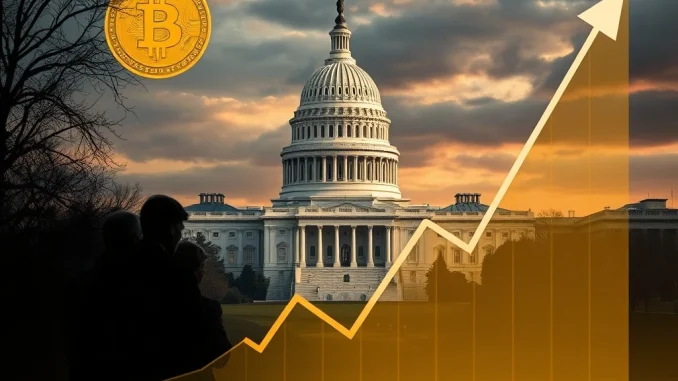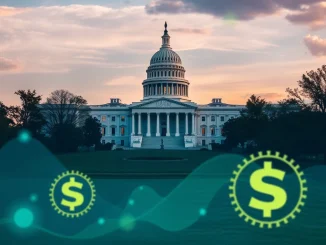
The world of finance is constantly evolving, with cryptocurrency pushing the boundaries of traditional systems. But what happens when these two worlds collide in a significant way, like with a proposed expansion allowing crypto assets as mortgage collateral? This bold initiative, designed to integrate blockchain-based assets into traditional lending, is currently facing significant bipartisan pushback in the U.S. Senate. Lawmakers are sounding an alarm, warning of potential systemic risks to both financial stability and consumer protections, making the future of the crypto mortgage a critical point of debate.
Why Are Crypto Mortgages Raising Systemic Risks?
A federal proposal to expand mortgage underwriting by accepting crypto assets as collateral has ignited a firestorm of concern among U.S. senators from both sides of the aisle. The core issue revolves around the inherent volatility of cryptocurrencies. Lawmakers argue that linking something as fundamental as a home loan to assets known for their wild price swings could introduce unprecedented instability into the financial system. Critics point to several key concerns:
- Market Volatility: The rapid price fluctuations of crypto assets could lead to sudden devaluations, leaving borrowers with underwater mortgages and lenders exposed to significant losses.
- Lack of Transparency: The opaque nature of some crypto transactions raises questions about the ability to properly assess collateral value and ownership.
- Regulatory Gaps: Current frameworks are not designed to handle the complexities of crypto-backed mortgages, creating a ‘gray zone’ where risks might go unaddressed.
One senator reportedly called the move a “reckless experiment with the livelihoods of American homeowners,” emphasizing the urgent need for safeguards against abrupt asset devaluation or fraud. These concerns underscore the potential for a ripple effect across the economy, creating unforeseen systemic risks that could impact everyone.
Navigating the Housing Market’s New Frontier
The potential impact on the housing market is a central theme in the Senate’s debate. For many Americans, a home is their most significant asset, and the stability of the housing market is crucial for overall economic health. Introducing highly volatile crypto assets into this equation could have profound consequences:
- Borrower Exposure: Homeowners could find themselves in precarious positions if their crypto collateral rapidly loses value, potentially leading to foreclosures even if they continue to make traditional mortgage payments.
- Market Destabilization: Widespread adoption of crypto-backed mortgages without adequate safeguards could amplify market downturns, turning crypto volatility into housing market instability.
- Consumer Protection: Lawmakers are particularly focused on ensuring that consumers are not unknowingly exposed to undue risk or predatory practices in this new lending landscape.
The Senate Banking Committee’s draft bill, which seeks to build on recent House legislation, aims to address crypto market oversight. However, critics contend that the focus should be squarely on protecting borrowers and preventing a destabilization of the very foundation of the American dream: homeownership.
Addressing Regulatory Gaps and Financial Stability
Beyond market volatility, a significant portion of the Senate’s apprehension stems from perceived weaknesses in existing Know Your Customer (KYC) and Anti-Money Laundering (AML) protocols within the crypto space. Lawmakers worry that opaque crypto transactions could inadvertently facilitate illicit activities, such as money laundering or tax evasion, if integrated into traditional finance without robust oversight. This directly impacts the broader goal of maintaining financial stability.
The legislative landscape itself is fragmented, adding to the complexity. While the House has primarily focused on consumer protections, the Senate’s draft bill prioritizes market oversight. This divergence leaves banks and mortgage lenders in a confusing regulatory gray zone, unsure of the rules of engagement for crypto-related financial products. Without a unified and clear regulatory framework, the risks of market manipulation, fraud, and systemic contagion increase significantly.
The Future of Crypto Mortgages: Balancing Innovation and Oversight
The debate over the expansion of crypto mortgage collateral highlights a fundamental tension between fostering financial innovation and ensuring robust oversight. Industry stakeholders are divided: fintech firms champion crypto integration as a means to democratize access to credit, potentially opening up new avenues for homeownership. Conversely, traditional financial institutions voice strong warnings about reputational and operational risks, concerned about integrating an asset class they deem too volatile and unregulated.
Analysts suggest that the outcome of this pivotal debate in the 2025 legislative session will fundamentally reshape mortgage finance. It will determine whether crypto truly cements its role in mainstream finance or remains largely confined to a speculative niche. Lawmakers have proposed forming a bipartisan working group to thoroughly evaluate the risks and benefits of crypto-driven mortgage expansion, though a timeline for this crucial assessment remains unconfirmed. For now, the initiative remains a focal point in the broader struggle to balance innovation with stability in an increasingly digital and interconnected global economy.
The bipartisan concerns raised by the Senate underscore the complexity of integrating novel technologies like cryptocurrency into established financial systems. While the promise of innovation is compelling, the imperative to protect consumers and maintain financial stability remains paramount. The decisions made in the coming legislative sessions will undoubtedly set a precedent for how digital assets interact with traditional finance, shaping the future of lending and investment for years to come.
Frequently Asked Questions (FAQs)
Q1: What is the federal proposal regarding crypto mortgage collateral?
A1: The proposal aims to expand mortgage underwriting by allowing borrowers to use crypto assets as collateral for home loans, integrating blockchain-based assets into traditional lending frameworks.
Q2: Why are U.S. senators concerned about this proposal?
A2: Senators are concerned about potential systemic risks to financial stability and consumer protections. They cite market volatility of crypto assets, lack of transparency, potential for illicit activities due to weak KYC/AML protocols, and existing regulatory gaps as major issues.
Q3: How could this proposal impact the housing market?
A3: Critics argue that linking mortgages to highly volatile crypto assets could destabilize the housing market. Borrowers could be exposed to sudden losses if their crypto collateral devalues, potentially leading to widespread defaults and undermining housing stability.
Q4: What are the main regulatory challenges highlighted by lawmakers?
A4: Lawmakers are concerned about fragmented legislation (House focusing on consumer protection, Senate on market oversight), potential weaknesses in KYC/AML protocols that could facilitate illicit activity, and a regulatory gray zone for banks and mortgage lenders.
Q5: What are the different perspectives from industry stakeholders?
A5: Fintech firms argue that crypto integration could democratize access to credit. In contrast, traditional financial institutions warn of significant reputational and operational risks associated with integrating volatile and less-regulated crypto assets.



